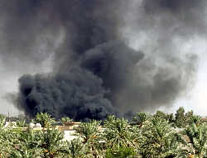
US troops and Iraqi security forces backed by warplanes and helicopters on Thursday launched a major assault on the Mehdi Army, followers of the radical Shiite leader and cleric Muqtada Al-Sadr, in the holy city of Najaf in a bid to end the fierce fighting there.
The aim of the attack is believed to be the decisive military solution to the resistance of the Mehdi Army.
However, the American forces are facing a complicated problem, for it fights inside a city that is considered to be one of the holiest cities for the Shiite in the world, where the shrine of Imam Ali Bin Abi Talib, the first Imam for the Shiite, is located. Sadr chose the shrine and the surrounding area as a shelter for him and his followers, thinking that the American forces would not risk entering this holy area for fear of infuriating the Shiites, including those who do not support Sadr.
The American forces might destroy the resistance there and probably kill or arrest Sadr if they insist on ignoring the feelings of the Muslims and attacking one of the holy places in the city.
At a press conference on Tuesday, Sadr called on his followers to continue fighting even if he was killed or arrested. It is widely believed that the Mehdi Army would end with the end of Muqtada Al-Sadr because there is no religious leadership to replace him.
The fierce fighting in Najaf, 160 km south of Baghdad, which has been persisting for an eighth straight day, could be considered as a battle of will between Sadr, who pledged to free Iraq from the US occupation, and the Iraqi interim government headed by Iyad Allawi, and the American forces.
The Americans are trying to give the impression that they are not entering the holy places, but the Iraqi force are, to avoid infuriating the Shiites and the Muslims in general. It seems that Mehdi Army in Najaf is not capable of winning the victory over the well equipped and air-dominated American forces, with the help of Iraqi police and national guard forces. However, Sadr counts on the support of his followers in most of the southern cities and the Iraqi capital to conduct some operations that would confuse the American forces and minimize the attack on Najaf.
It is expected that the interim government, headed by Allawi, would be the first victim of the Najaf battles, especially after demonstration in many Iraqi cities demanded the government's resignation.
Saad Ali, a retired officer, thinks that the government, which came to ensure security in the country, did not have enough time to implement its task. In Najaf battles, the government does not have any decision at hand.
The military leadership and the decision are in the hand of the American forces in spite of the official declaration of the power handover to the Iraqi government on June 28.
Mohamed Sabry, a writer, thinks that bringing Iraqi out of its chaotic and violent presence into a future of democracy and prosperity, there should be leaders with authority and political sensitivity, and they should find a way to show their ability to gather all conflicting parties.
Such ambitions could result in Allawi loosing his post, being replaced by others like Ahmad Chalabi, a leading figure of the Iraqi National Congress, who is trying to build his reputation as having differences with the US forces and win support from Shiite parties.
Observers blame the Iraqi government for using excessive force and the method of collective punishment against the rebellious cities.
But Satar Jabbar, a university professor at the College of Political Sciences, said that the use of force against the followers of Sadr was extremely exaggerated.
The UN is trying to interfere in the Iraqi conditions by calling for dialogue to solve the disputes. But no one listened to it and the new envoy to Iraq did not comprehend what was going on around him.
It is expected that the Security Council would extend on Thursday the mission of the UN delegation to Iraq, which started on Aug. 14, 2003, for another year.
(Xinhua News Agency August 13, 2004)
|

